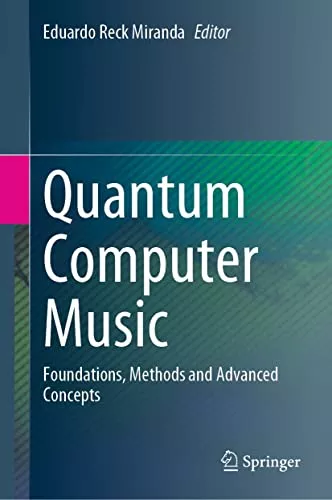Quantum Computer Music: Foundations, Methods & Advanced Concepts PDF
This book explores music with respect to quantum computing, a nascent technology that is advancing rapidly. There is a long history of research into using computers for music since the 1950s.
Nowadays, computers are essential for the music economy. Therefore, it is very likely that quantum computers will impact the music industry in the time to come. Consequently, a new area of research and development is emerging: Quantum Computer Music.
This unprecedented book presents the new field of Quantum Computer Music. It introduces the fundamentals of quantum computing for musicians and the latest developments by pioneering practitioners.
From the Back Cover
This unique text/reference explores music with respect to quantum computing, a nascent technology that is advancing rapidly. Quantum computing promises to bring unprecedented higher speed and optimisation for running algorithms. Of course, this will benefit the music industry in one way or another, but also yield new approaches to musical creativity.
There is a long history of research into using computers for music since the 1950s, and nowadays, computers are essential for the music economy. Indeed, it is very likely that quantum computers will impact the music industry in times to come. Consequently, a new area of research and development is emerging: quantum computer music.
This unprecedented book examines this new field, introducing the fundamentals of quantum computing for musicians and the latest developments by pioneering practitioners. Each chapter focuses on innovative approaches that leverage the quantum-mechanical nature of quantum computing. Any additional theory required for understanding a given approach is supplied in the respective chapter, and plenty of references are provided. The book also includes some tutorials and walk-through examples, in addition to addressing scientific and aesthetic considerations.
Written by pioneering experts, the present volume will serve as a first-of-its-kind reference for all those interested in or studying this fascinating and promising new field.
Prof. Eduardo Reck Miranda is a composer and a professor in Computer Music at Plymouth University, UK, where he is a director of the Interdisciplinary Centre for Computer Music Research (ICCMR). His previous publications include the Springer titles Handbook of Artificial Intelligence for Music, Guide to Unconventional Computing for Music, Guide to Brain-Computer Music Interfacing and Guide to Computing for Expressive Music Performance.
About the Author
Professor Eduardo Reck Miranda (M.Sc., Ph.D.) is a composer and artificial intelligence (AI) scientist. He is a professor in Computer Music at the University of Plymouth, UK, where he is a director of the Interdisciplinary Centre for Computer Music Research. He is championing research into brain–computer interfaces, AI and unconventional computing applied to Music Technology.
Before moving to the University of Plymouth, Eduardo worked at Edinburgh Parallel Computing Centre, where he developed pioneering work on using supercomputers in musical composition. He subsequently worked for Sony Computer Science Laboratory Paris for several years, developing AI applied to music and linguistics. In 2006, he was appointed Edgar Varese Guest Professor at the Technical University of Berlin.
His previous publications include the Springer titles ‘Handbook of Artificial Intelligence for Music’, ‘Guide to Unconventional Computing for Music’, ‘Guide to Brain-Computer Music Interfacing’ and ‘Guide to Computing for Expressive Music Performance’.








